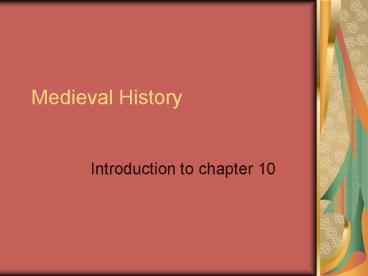Medieval History - PowerPoint PPT Presentation
1 / 37
Title:
Medieval History
Description:
From a historical perspective, the Renaissance cannot be clearly separated from the middle ages. ... Date of equinox shifted. 1582 Pope Gregory XIII ... – PowerPoint PPT presentation
Number of Views:88
Avg rating:3.0/5.0
Title: Medieval History
1
Medieval History
- Introduction to chapter 10
2
500-1500 Common time frame
- No true consensus on dates.
- 476-1453 are generally considered.
- Each date marked the fall of an empire.
- 476-The fall of Rome.
- 1453-Eastern Empire fell, Constantinople to the
Turks.
3
Dark Age Age of Faith "Middle Age"
between classical Greece Rome 15th C.
revival of those ideas.
4
- From a historical perspective, the Renaissance
cannot be clearly separated from the middle ages.
5
Throughout the medieval era
- Only (1) institution came close to uniting all of
Europe - The Catholic Church
6
306 Constantine Caesar co-ruler of Roman
Empire.
7
Born 2-27-271,2,or 3. In 312 AD
- Converted to Christianity.
Died 5-22-337
8
392 AD
- Christianity became the official religion of the
state. - A cult became the established religion.
9
325 AD
- Council of Nicaea.
- 1st ecumenical (world-wide) council of the
church. Bishops from all over the known world
attended. - Issued Nicene Creed.
- Solved controversy over timing of Easter.
10
Mercenary for Rome. Revolted overthrew Romulus.
Odoacer
Seized Rome in 476.
11
590 AD
- Pope Gregory, the Great.
- Born 540, died 3-12-604.
- Established the Papacy as a strong,
socio-political force
12
1517 AD
- Martin Luther
- posted 95 theses criticizing the Catholic Church.
- Beginnings
- of the Protestant Reformation.
13
Justification by faith
- If you believe, God accepts you and forgives your
sins. - Eternal life by faith.
- Luther criticizes sale of indulgences. Buying
people out of purgatory and getting them into
heaven. (church practice)
14
(No Transcript)
15
1521 AD
- Luther was excommunicated.
- Appeared before the Diet of Worms.
- Asked to renounce his teachings.
- He refused. Says scripture doesnt support the
authority of the pope.
16
(No Transcript)
17
Ultimately, the Protestant Reformation split the
western church, then religious wars
spread throughout Europe.
Ultimately the Protestant Reformation split the
western church, then religious wars spread
throughout Europe.
18
1648
- Wars ended with the Peace of Westphalia.
19
Series of treaties to end 30 years war
- Netherlands is independent.
- Calvinists get legal recognition.
- 3 new powers Sweden, France the Netherlands.
- Switzerland is independent.
- Begins the modern system of nation states.
20
Medieval studies are eurocentric. The Medieval
era is a European concept. The rest of the world
is important, but more as how it affected
events in Europe.
21
Europe is not a distinct geographic entity
during the middle ages. Was considered
"Christendom".
22
(No Transcript)
23
Borders were shifting often
- No political force controlled everything.
- By late 15th C. westward exploration of the new
world created an awareness in Europeans of their
old world.
24
15th Century a turning point
1453 end of 100 Years War. Unification of France.
25
1485 War of Roses
- Between Houses of Lancaster York ends in
Britain. Begins extensive peace within.
26
Ferdinand Isabella
1492 Moors driven from Spain. Jews
expelled. Catholic unity prevailed.
27
Moors were Muslims living in Spain.
- Came from present day Morocco western Algeria.
- Defeated by Charles Martel, Charles the Hammer
at the Battle of Tours in 732.
28
Changes were everywhere. Nations established
modern identities. Europe took on a cohesive
identity of its own.
29
Nation state
- A political state whose people share the same
language and culture.
30
Medieval Era
- Divided into 3 periods.
- Early middle.
- High middle.
- Late middle.
31
Early Middle Ages
- From the Fall of Rome to the 11th century.
- Dark Ages
- Charlemagne, Alfred the Great, Viking Activity,
Iconoclastic controversy, expansion of Islam,
Christianity spread, Papacy evolved into powerful
political entity.
32
High Middle Ages
- 11th to 14th centuries.
- Norman conquest, Crusades, Investiture
Controversy, Magna Carta, establishment of
universities, feudalism firmly established, trade
flourished.
33
Late Middle Ages
- 14th to 17th centuries.
- 100 Years War, Black Death, Italian Renaissance,
Peasants Revolt, Joan of Arc, Fall of
Constantinople, War of the Roses, Columbus,
Protestant Reformation, Shakespeare.
34
By the end of the era
- Regard for the value of the individual over
groups was growing. Seeds of the idea of human
rights had been sown.
35
Other terms to know
- Ano Dominae the year of our lord.
- BC before Christ.
- Common Era time beginning with birth of Jesus.
- BCE before common era.
- Millennium 1000 year period.
- Century 100 year period.
- Decade 10 year period.
- Is there a year Zero?
36
46 BC, Julius Caesar
- Reformed the calendar.
- Added Leap year.
- Julian calendar.
- 365 days, 6 hours longer than a solar year.
Created error over years. - Date of equinox shifted.
37
1582 Pope Gregory XIII
- Dropped 10 days (Oct 5-14) and fixed the leap
year problem. - The reformed Julian (Gregorian Calendar) was not
used by England colonies until 1752. - Centuries ending in hundreds not leap year unless
divisible by 400.





























![Download [PDF] The History of the Medieval World: From the C PowerPoint PPT Presentation](https://s3.amazonaws.com/images.powershow.com/10114218.th0.jpg?_=20240831065)

![read [pdf] medieval warfare: a history PowerPoint PPT Presentation](https://s3.amazonaws.com/images.powershow.com/10141141.th0.jpg?_=20240927044)